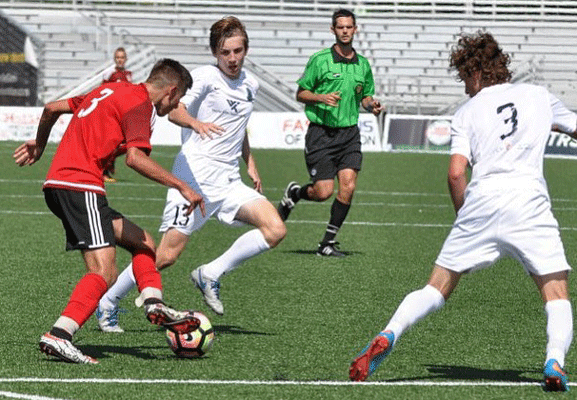Onto the Big Leagues
Coleman completes the recruitment process by committing to play D1 soccer at Notre Dame.

Many athletes who aspire to take their sport to the collegiate level must undergo the process of recruitment. Getting recruited to play sports in college can be a very stressful journey for both athletes and their families. The recruitment process can start as early as seventh grade and end as late as the summer immediately before college begins. The important thing is to be prepared before entering high school. There is an abundance of rules, strategies and tips that play a part in understanding the recruitment game.
For junior Patrick Coleman, this process meant time and patience, and his patience paid off in the long run.
Coleman’s No. 1 choice, the University of Notre Dame, is among the top 15 division one men’s soccer colleges. On December 18, 2016, Coleman committed his next four post-high school years to the University of Notre Dame. In the fall of 2018, Coleman will become a part of the Fighting Irish on the men’s soccer team as he pursues his dream at the next level.
“I feel very relieved,” Coleman said. ”The process was long and stressful, and after committing, I don’t have to worry about all of that anymore.”
The recruitment process puts athletes on an adventure that will entail many ups and downs, but ultimately help write the next chapter of their lives.
According to Coleman, he loved the coaches, the team and the whole environment of the University of Notre Dame. The start of Coleman’s visit was exploring the campus, which in his mind was nothing short of beautiful. Following the tour, Coleman got to know his coaches better over lunch, listened to the student-athlete expectations with an academic advisor, scoped out the fields and locker room and ended with meeting some of his future teammates.
“After my visit, Notre Dame was definitely at the top of my list,” Coleman said.
While having the relief of the recruitment process being over, there are still very high demands that athletes must meet going into their freshman year of college. College coaches expect their athletes to not only be committed verbally, but to themselves and the improvements necessary for success at the next level.
“College soccer is very physical, and I know I need to prepare for that by getting stronger,” Coleman said.
The Process in Brief
Getting organized is one of the first goals to set when preparing for recruitment. It is very crucial to stay on top of the different information that you send and receive. Whether it is the use of spreadsheets, calendars, planners or even different charts, an athlete must keep track of academic and athletic information, targeting list of schools, when and what you have discussed with coaches, progress checks, emails and school/camp information. Part of getting recruited is knowing and understanding your process.
According to the National Collegiate Athletic Association (NCAA), there are rules regarding every aspect of the recruiting process that must be followed each year of the process by the athlete and the collegiate level coaches. As a freshman and sophomore, college coaches may send athletic or sports camp brochures, NCAA educational information and questionnaires. A college coach can also accept phone calls, but cannot return a message or call an athlete back.
These rules apply until September 1 of an athlete’s junior year. Junior year, college coaches are only permitted to call an athlete off campus after July 1. Coaches are also permitted one phone call a week while an athlete is able to call as often as he or she pleases. Senior year, the laws of the NCAA become more lenient as an athlete becomes closer to approaching commitment. After the first day of senior year, an athlete can make up to a maximum of five official visits with the schools of his or her choosing. These can be expense-paid visits as long as the athlete is not on campus for more than 48 hours. At this point, coaches may now contact the recruits along with discussing further recruitment plans such as scholarships.
The last step of the recruitment process for an athlete is the most exciting: commitment day. A verbal commitment is a verbal agreement for an athlete to play their sport at a college. Following this agreement, a National Letter of Intent is signed, ending the process completely. This letter is an agreement that a college-bound student-athlete signs, agreeing to attend and play for a college for one academic year. This is known as an official commit and the best day of an athlete’s life.

